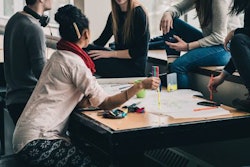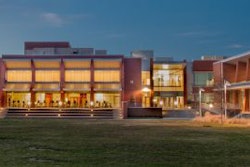For Pablo Avila, working in higher education wasn’t something that he thought he’d ever been doing professionally.
In fact, up until a few years ago, he was thinking about pursuing a Ph.D. in social psychology.
However, after graduating from Hunter College and receiving a bachelor’s degree in psychology, he was hired in 2010 in the Center for Teaching and Learning at CUNY’s LaGuardia Community College, where he taught students how to build and develop electronic portfolios — or ePortfolios.
After serving “such a diverse” student population at LaGuardia, Avila developed a growing interest in education and the “complexity of the higher education system” and decided to pursue a master’s degree in educational psychology at Hunter while continuing to work at LaGuardia.
In 2016, Avila was appointed as a first-year program and assessment coordinator at the center where he supervised a team of 40 peer mentors who worked with faculty teaching a first-year seminar course across eight disciplines.
A 2007 LaGuardia graduate himself, Avila used his own experiences to help first-year students easily transition to community college and four-year institutions.
Though it didn’t take Avila — an immigrant from Peru — longer than the traditional two years to graduate from LaGuardia and move onto his graduate studies at Hunter, “I still grappled in different challenges – in language, adjusting to the curriculum, adjusting to the campus, getting to know the resources,” he says.
“Even though I wasn’t part of any activities or I wasn’t part of any particular student program I somehow made it through, but it certainly wasn’t a smooth transition or experience,” he adds.
In this position, Avila constantly reflected on his own student experiences and struggles to help faculty members find ways to help first-year students become accustomed to LaGuardia and develop a sense of belonging and sense of community so they could ultimately complete their associate’s degree at LaGuardia.
Today, Avila is an associate director of ePortfolio and Digital Learning at the Center for Teaching and Learning at LaGuardia where he monitors all of the ePortfolio implementations and development across multiple disciplines within the community college.
Avila is also enrolled in a doctoral program in the Higher and Postsecondary Education program at Teachers College in Columbia University that prepares future scholars and higher education practitioners to become critical thinkers and active members of the community.
“Being part of this program while working at a community college allows me to integrate knowledge and theory in meaningful and practical ways,” he says. “I find that what I learn in the classroom directly impacts my working environment and optimizes my performance and decision making process.”
As associate director of ePortfolio and Digital Learning, Avila monitors the expansion across four key areas: ePortfolio use and curriculum integration, digital learning programming, faculty and staff professional development and data reporting for assessment and program outcomes. He also leads seminars for faculty teaching capstone courses.
“One of the things that I always found interesting is how every time I’m in a seminar and I’m working with faculty, I’m thinking, ‘How do I implement this? What is it I want to do? Why do I want to ask my students to do this?’ Avila says.
The center offers a faculty professional development seminar to help ensure that faculty members are successful in the classroom.
“We want to make a change, whether it’s on your capstone course or your first-year seminar course,” says Avila. “You want to learn from one another. Whenever you,for example, put a chemist and a psychologist at the same table, their interaction, seeing they’re dynamically different in terms of point of view, there’s so much that they can learn from one another,” he adds.
On the other hand, working with faculty in professional development settings can be difficult and have it fair share of challenges, says Avila.
“You have disciplines that are very open to professional development opportunities, there’s always disciplines that are not,” he says. “There’s faculty that think that they don’t need to think through their strategy or their pedagogy; that they have a Ph.D. and they know it all. They only speak about the field. They learn so much about the subject matter but they don’t get to think about this idea of teaching that content. I have spoken with so many faculty who get their Ph.D. and suddenly they are immersed into teaching.”
After receiving his Ph.D. from Columbia, Avila hopes to broaden and expand his experience within higher education, with the long-term goal of someday becoming a college president.









